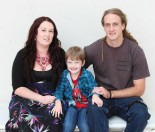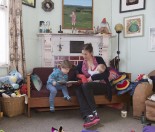Kiwi Families has a focus on pregnancy and babies at the moment, and we’ve been talking to some great kiwi families about their experiences. In this post we meet Kate, who shares with us her personal story related to processing a number of miscarriages and how they have profoundly affected her on several levels. We are grateful for her openness – reading these experiences shared by many may well help those who are dealing with similar circumstances to know that they are not alone.
Kate’s story
My partner and I had been trying for a baby for about six months and when I fell pregnant we were very happy, and excited. Our happiness soon turned to shock and sadness when I miscarried at approximately eight weeks. However we dealt with it, and life was soon back to normal. I was very sad about it but I rationalised that this does happen to some people, and that apparently it is quite common. We resolved to keep trying for a baby, and a while later I was again pregnant.
This time I was very happy again, but during this pregnancy I was more nervous than the first. I was overly concerned about miscarrying – and that maybe something I did, or did not do could cause a miscarriage. I felt a lot of hope though, because I really thought it unlikely that I would miscarry again (lightening doesn’t strike twice right?)
When I saw the same signs at approximately eight weeks, I was indeed very shocked. The physical happenings were not so shocking this time around because I knew what to expect from last time, but I would say the disappointment was worse as I really had my hopes up. Also after having the two miscarriages I began to feel real concern that there was something wrong with my body, or perhaps this was punishment for having a termination at age 17. I beat myself up about the second miscarriage far worse than the first. Around this time a lot of my friends were having babies, and I found that really hard to be around. It was hard to be happy for them as when I saw them I felt a twinge of jealousy.
To help me process what I’d been through, I sought help from a pregnancy counselling service as my experiences were really affecting my day to day life. I was depressed and tearful often. The counselling sessions helped to an extent. I saw a OBGYN and had my fertility investigated. The doctor saw no real reason why I had been miscarrying, but we went under his care, and tried to conceive again. I fell pregnant after several months, and was closely monitored throughout. I was incredibly nervous, I didn’t think I could handle another miscarriage. Thankfully I was quite intensively monitored, with weekly scans at first, then fortnightly.
Fortunately, that pregnancy worked out and I now have a daughter (4 ½ years old). To be honest that was the only thing that really helped my grief, and completely resolved it (I know that’s not much solace to women experiencing miscarriages though). I realise if that series of events weren’t to have happened, I wouldn’t have the daughter that I have today – I believe, the one I was always meant to have.
I have since had a third miscarriage, at approximately five weeks, when my daughter was about six months old – although I was sad, it didn’t affect me much. I took it to be par for the course, and just considered myself lucky to have my girl.
____
As Kate has reflected on her experiences, and studied grief, loss and trauma, she has found great clarity in what she has been through. She came to realise that many of her responses (such as jealousy towards others with babies) were not something to be ashamed of, but were completely normal. She has found understanding and working through the various stages of grief to be useful, so that she no longer considers her identity to be wrapped up in being a woman who has miscarried.






